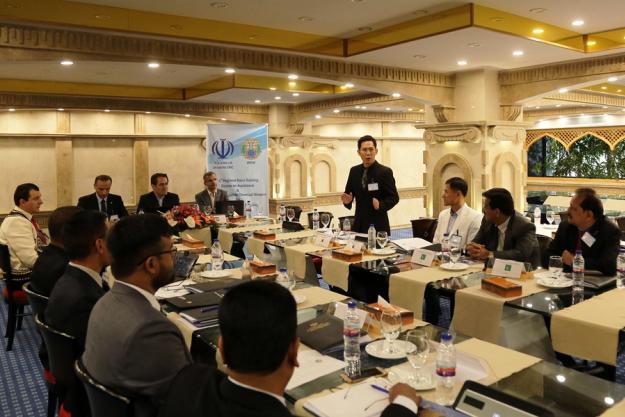
Participants at an emergency assistance and protection against chemical weapons course in Tehran, Iran
THE HAGUE, Netherlands — 10 July 2017 — First responders from Asian countries acquired fundamental knowledge on emergency assistance and protection against chemical weapons at an Organisation for the Prohibition of Chemical Weapons (OPCW) course held in Tehran, Iran from 28 June to 2 July.
The course, organised by the OPCW and the Government of the Islamic Republic of Iran, assisted in building the capacities of 15 OPCW Member States for national and regional chemical emergency response within the framework of Article X of the Chemical Weapons Convention.
“The work of first responders serves as a bulwark of protection of all citizens from the threat of chemical agents and industrial toxic chemicals. This training will strengthen not only national but also regional regime of assistance and protection, which is one of OPCW’s chief priorities,” stated OPCW’s Senior Assistance and Protection Officer, Mr Shahriar Khateri.
Twenty-four participants gained essential understanding of chemical warfare agents and toxic industrial chemicals; medical countermeasures in the case of chemical emergencies; and the use of equipment for individual protection, detection and decontamination.
The attendees also shared information and experiences on a wide variety of issues pertaining to the implementation of Article X of the Convention. Many ideas emerged on the future cooperation among the participating Member States, as well as the types of assistance and protection support they might lend to each other through OPCW facilitation.
This basic course was the first part of the first responder training cycle in Asia, with an advanced course planned for September 2017 in Seoul, Republic of Korea.
Background
As the implementing body for the Chemical Weapons Convention, the OPCW oversees the global endeavour to permanently eliminate chemical weapons. Since the Convention’s entry into force in 1997 – with its 192 States Parties – it is the most successful disarmament treaty eliminating an entire class of weapons of mass destruction.
Ninety-five per cent of all chemical weapon stockpiles declared by possessor States have been destroyed under OPCW verification. For its extensive efforts in eliminating chemical weapons, the OPCW received the 2013 Nobel Prize for Peace.
